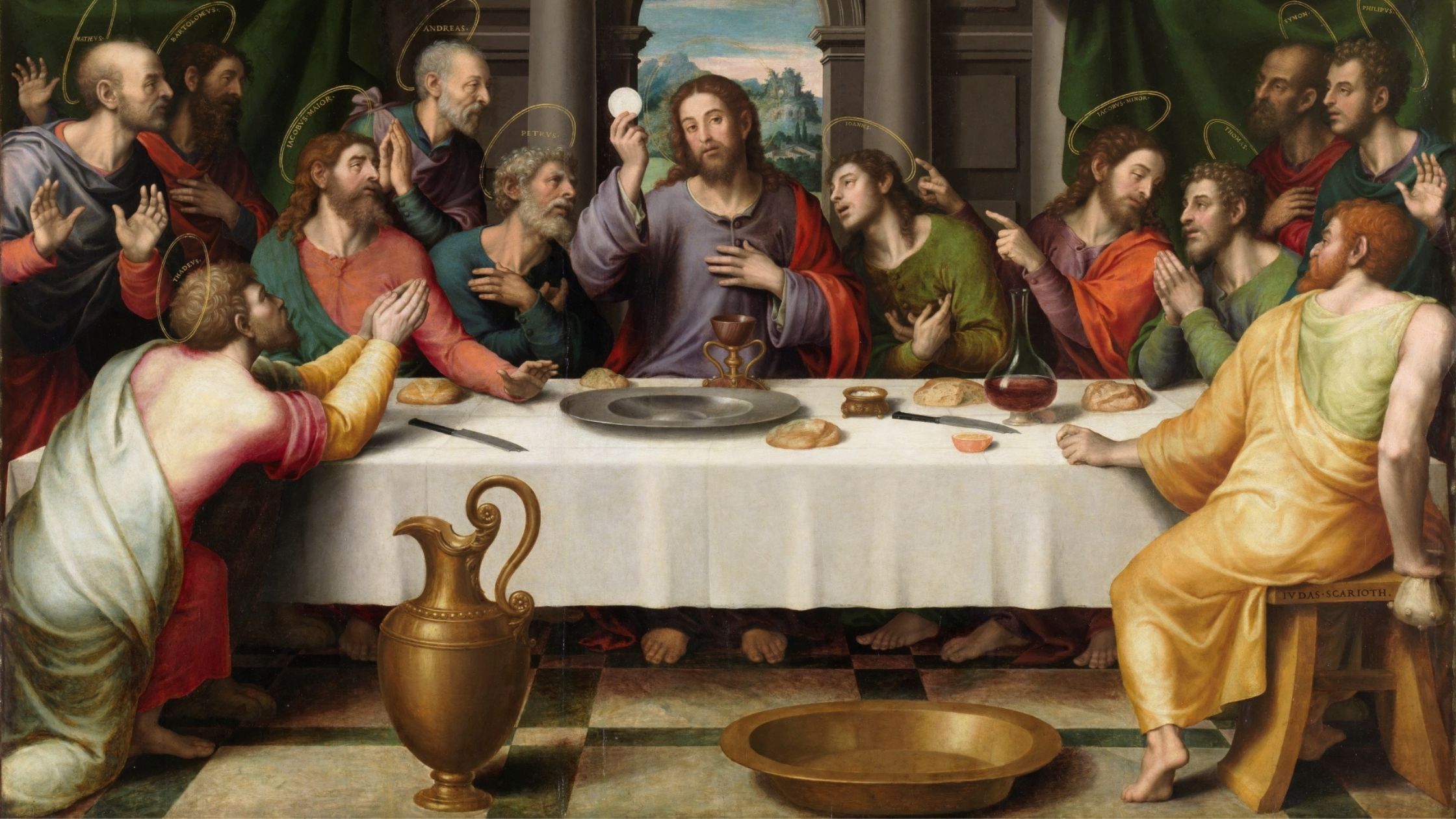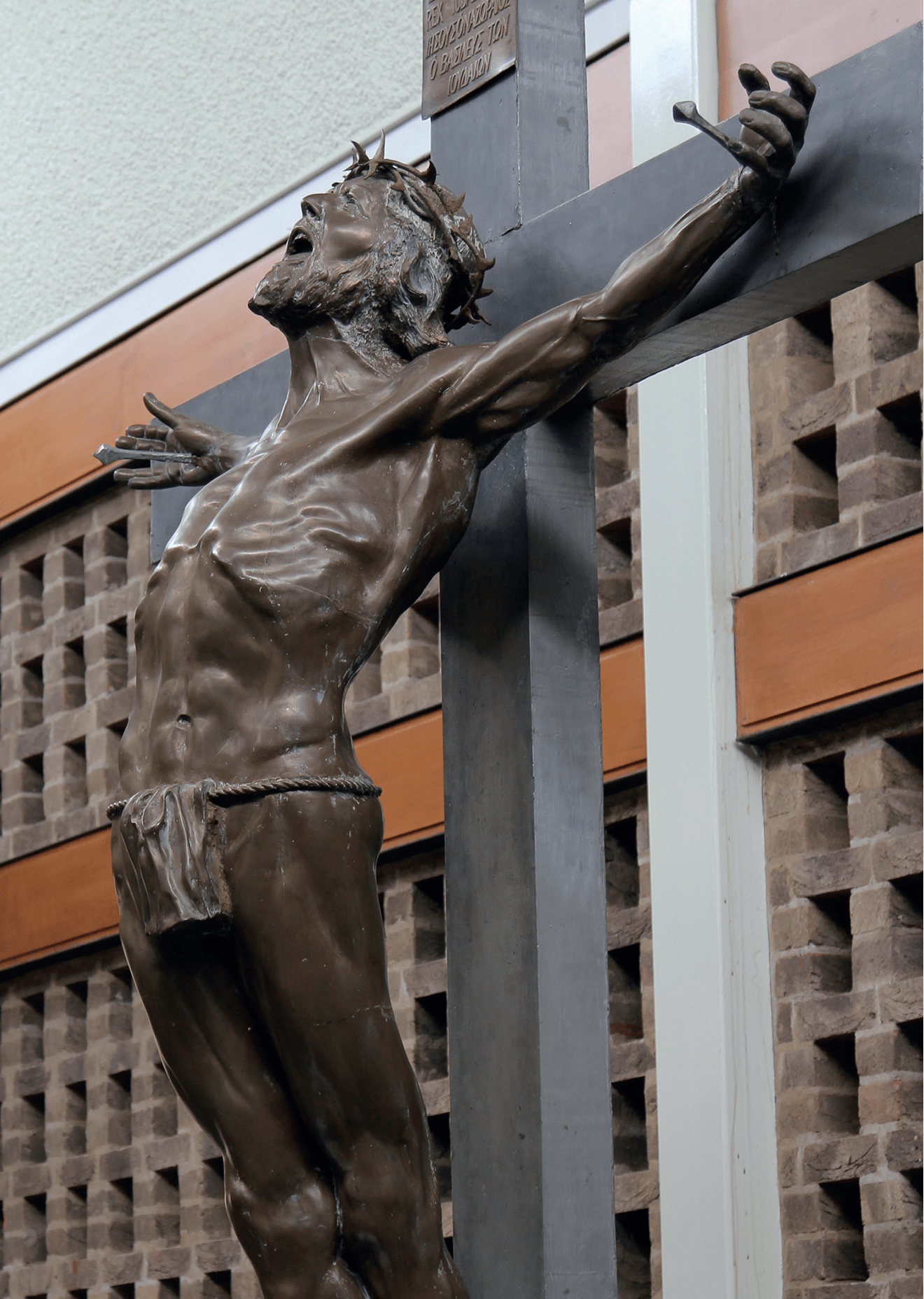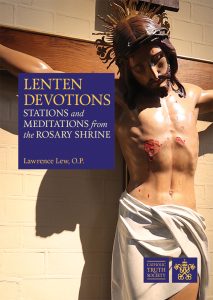“We are not scandalised, because Jesus himself was not scandalised by seeing that his joyful preaching of salvation to the poor was not received wholeheartedly, but amid the shouts and threats of those who refused to hear his word or wanted to reduce it to legalisms such as moralism or clericalism. We are not scandalised because Jesus was not scandalised by having to heal the sick and to set prisoners free amid the moralistic, legalistic and clerical squabbles that arose every time he did some good. We are not scandalised because Jesus was not scandalised by having to give sight to the blind amid people who closed their eyes in order not to see, or looked the other way. We are not scandalised because the preaching of the Gospel is effective not because of our eloquent words but because of the power of the cross.”
– Pope Francis
Collect for Maundy Thursday
O God, who have called us to participate in this most sacred Supper, in which your Only Begotten Son, when about to hand himself over to death, entrusted to the Church a sacrifice new for all eternity, the banquet of his love, grant, we pray, that we may draw from so great a mystery, the fullness of charity and of life. Through our Lord Jesus Christ, your Son, who lives and reigns with you in the unity of the Holy Spirit, God, for ever and ever.
Collecta
Sacratissimam, Deus, frequentantibus Cenam, in qua Unigenitus tuus, morti se traditurus, novum in sæcula sacrificium dilectionisque suæ convivium Ecclesiæ commendavit, da nobis, quæsumus, ut ex tanto mysterio plenitudinem caritatis hauriamus et vitæ. Per Dominum nostrum Iesum Christum Filium tuum, qui tecum vivit et regnat in unitate Spiritus Sancti, Deus, per omnia sæcula sæculorum.
Today’s Gospel: John 13:1-15
It was before the festival of the Passover, and Jesus knew that the hour had come for him to pass from this world to the Father. He had always loved those who were his in the world, but now he showed how perfect his love was.
They were at supper, and the devil had already put it into the mind of Judas Iscariot son of Simon, to betray him. Jesus knew that the Father had put everything into his hands, and that he had come from God and was returning to God, and he got up from table, removed his outer garment and, taking a towel, wrapped it round his waist; he then poured water into a basin and began to wash the disciples’ feet and to wipe them with the towel he was wearing.
He came to Simon Peter, who said to him, ‘Lord, are you going to wash my feet?’ Jesus answered, ‘At the moment you do not know what I am doing, but later you will understand.’ ‘Never!’ said Peter ‘You shall never wash my feet.’ Jesus replied, ‘If I do not wash you, you can have nothing in common with me.’ ‘Then, Lord,’ said Simon Peter ‘not only my feet, but my hands and my head as well!’ Jesus said, ‘No one who has taken a bath needs washing, he is clean all over. You too are clean, though not all of you are.’ He knew who was going to betray him, that was why he said, ‘though not all of you are.’ When he had washed their feet and put on his clothes again he went back to the table. ‘Do you understand’ he said ‘what I have done to you? You call me Master and Lord, and rightly; so I am. If I, then, the Lord and Master, have washed your feet, you should wash each other’s feet. I have given you an example so that you may copy what I have done to you.’
A Maundy Thursday Reflection on the Seven Last Words of Jesus
Written by Fr Lawrence Lew OP and extracted from our book Lenten Devotions.
The Seven Last Words of Our Lord have, from the sixteenth century, been the subject of meditations of Good Friday. Fr Lawrence Lew OP’s set of reflections, the first of which is presented here, was first preached in Holy Week of 2022, during the Rosary Shrine’s annual “Holy Week Retreat”.
The fourth word (see Mt 27:46):
To God, his Father:
My God, my God, why have you forsaken me?
On Palm Sunday last year, my classmate from primary school, whom I have known since I was six but had not seen in over thirty years, was visiting London from Korea, and came to our Solemn Mass that day. The response to the responsorial psalm that day was this, the fourth word of Christ from the cross: “My God, my God, why have you forsaken me?” It is, of course, also the opening lines of Psalm 21, a psalm attributed to King David. After the Mass, as he was waiting for his cab, he said to me: “I have never really understood those words of Jesus. Why did he say, ‘My God, my God, why have you forsaken me?’” What answer could I give in the one minute before his cab came? I told him, briefly, what I will expand upon now: Christ, the Second Person of the Trinity, is, of course, never separated from nor abandoned by the Father. This would be impossible. However, in becoming man and sharing our human condition, God willed and lovingly chose to share our human experience down to the very depths and dark pits of depression that we can experience. On the cross, Christ endures not only bodily pain but also the sufferings of the soul, psychological pain. Indeed, as St John Henry Newman says: “It was not the body that suffered, but the soul in the body; it was the soul and not the body which was the seat of the suffering of the Eternal Word.” Thus, Jesus says in Gethsemane: “My soul is very sorrowful, even to death” (Mt 26:38), and this mental anguish is so great that the Evangelists note that Jesus sweats blood. This is a rare medical condition called hematidrosis, and it is caused by extreme distress or fear, feelings our Lord experienced as he began to undergo his passion for our sake.
On the cross, when the crucified Lord utters these words, he expresses, as “true man” and as the Head of humanity (see 1 Co 11:3), the fullest extent of the psychological sufferings that human beings can experience. In permitting himself to endure everything that we human beings have to endure, so Christ chooses to share this deepest of existential pains: the sense of being alone, without a loving father, or even a loving God. Indeed, to think that there is no God, to truly be an atheist, creates a deep sadness of soul that can depress and warp a whole society. But even here, in this deep sorrow, a sorrow very much of our times, Christ our God wills to be present. Christ lovingly chooses to suffer this sorrow with us; with atheists; with those who have been abandoned by a parent; with people who do not experience God’s love and closeness; with those who cannot pray and are sorrowful as a result; with those who might, in times of sickness, distress and grief, feel that God is absent; with all who are confounded by the world’s terrors and uncertainties and heartaches, and who wonder: “Where is God? Why has he forsaken or abandoned us?”
Jesus, however, is not aloof from this existential angst. He is not distant and uncaring of our anguish. For here on the cross, he cries out and gives voice to the deep sorrow of soul that afflicts so many of our contemporaries, and that perhaps also gnaws at us. But Jesus cries out with these words of Psalm 21, which thus remind us that this feeling of the absence, the forsakenness, of God, is an experience that great religious men, such as David and Job, have all endured. These holy seers of times past have stared into the abyss, confronted the silence, and they all point to this moment of the cross, to Jesus who calls out, giving voice to the deepest sorrow of the human heart: “My God, my God, why have you forsaken me?”
Can you see the profound love and compassion of Christ? He so desires to show us that he is Emmanuel, God- with-us, that he wills even to undergo this anguish with us. He is not play-acting, but, in his humanity, freely willing it; Christ really does feel as we sometimes feel: abandoned by God. Except that now, even in those depths of depression and angst, we cannot any longer be abandoned by God. Through his crucifixion, Christ is now evermore there with us in our forsakenness. Therefore the psalm (139) rightly says: “O where can I go from your spirit, or where can I flee from your face? If I climb the heavens, you are there. If I lie in the grave, you are there.” For “even darkness is not dark for you and the night is as clear as the day”. Where, then, is God? Right there, with us, with you, in the darkness!
Cling to these words of the Lord, hold on in your minds to this bitter moment on the cross. Then, in the darkness, in those times when you feel as though you are lying in your grave, remember that Christ too endured this sense of being abandoned by God, and that he lovingly chooses to enter into our darkness in order to make it “as clear as day”. For his presence is the light; he is God-with-us.
Let us end with the prayer that the Angel of Peace taught to the holy children of Fatima:
“My God, I believe, I adore, I hope and I love Thee! I ask pardon for those who do not believe, do not adore, do not hope and do not love Thee.”
This reflection is extracted from our book Lenten Devotions: Stations and Meditations from the Rosary Shrine. Fr Lawrence Lew OP offers three powerful Lenten devotions: Stations of the Cross featuring photographs and meditations, the Canticle of the Passion based on words revealed to St Catherine de Ricci, and recollections on the seven last words of Jesus on the Cross.
Find more powerful Lenten devotions and reflections, and support the mission of CTS, by ordering your copy of Lenten Devotions today.
Want the Saint of the Day sent straight to your inbox? Sign up for our Saint of the Day emails and we’ll help you get to know the saints by sending you an email on the feast or memorial of every major saint, and on the optional memorial of select other saints. Opt out at any time.



